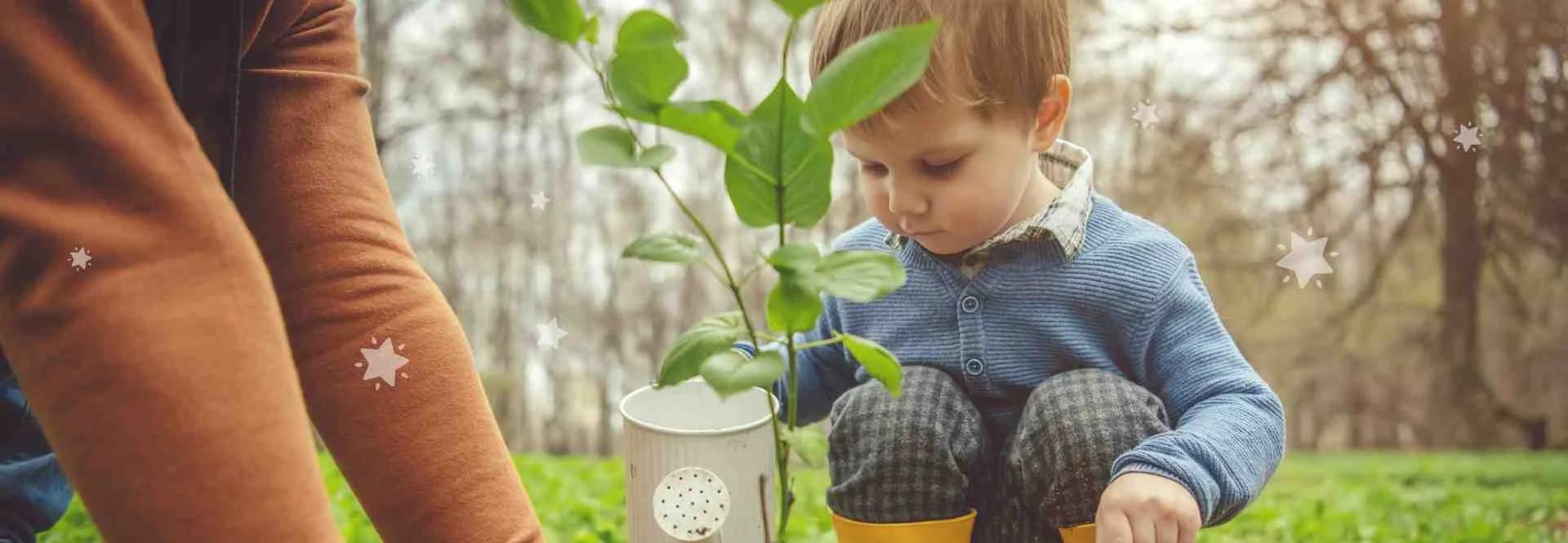Gardening with Your Child
Gardening is a rewarding activity for the whole family. Whether you’re planting flowers, edible plants, or simply digging in the dirt, the practice can teach preschoolers how to relate to the natural world and learn about cause and effect. Start small and allow preschoolers to help you as much or as little as they would like. Even if they’re only digging in the dirt, they’re still learning!
Some of the benefits of gardening for preschoolers include:1,2
-
Physical. Working in the garden helps preschoolers develop fine muscle control as they use shovels and rakes to turn over dirt. If they’re doing a lot of moving around, they’re also working their larger muscles, making an activity that might be viewed by some as sedentary a whole-body workout for your little one! They’ll be moving their bodies, carrying items, and using a pincer grasp when picking up tiny seeds.2 As an added bonus, they’ll be outside in the fresh air, and getting exercise.
-
Emotional.Gardening has been shown to reduce stress while improving attention and memory. Gardens can be bright, colourful places and children who are involved in the process of growing foods are more likely to try new ingredients, especially if they’ve been involved in its cultivation!
-
Academic. Studies have shown that working in a garden can increase math and science skills and can even boost scores on standardized exams! Gardening involves remembering and analyzing information, as well as predicting outcomes, like which plants might sprout first, and which seeds were planted where.
Parents and caregivers can work with their preschooler on a variety of skills like counting, vocabulary, and probability!1 Working together in a garden can be a wonderful bonding experience between you and your preschooler. You’ll get to learn how your child thinks while creating lasting memories and fostering a love of growing things.2
Gardening Activities for Preschoolers
While the benefits of gardening with your preschooler cannot be denied, you may find some difficulty in getting started. Look to this list of activities for suggestions on how to get your little one digging in the dirt and getting excited about gardening:3
-
Start small. If you and your preschooler are going to start gardening together for the first time, remember that your little one likely has a short attention span and might be overwhelmed by a big project. A window planter full of fast-growing herbs is a great idea, or simply planting flowers in front of your house can hold their interest. A cup of dirt with a bean planted in it can be an excellent introduction to the concept of a plant lifecycle. A pot with a tomato plant might be all your little one needs to learn about the basics of gardening. Before you get started, think about your child and the space you have to work with. If you’re an avid gardener already, carve out a small space for you and your preschooler to work together so that they can take ownership of it.
-
Choose high-interest plants. Let your child help you choose what to plant! Cherry tomatoes can produce a lot of fruit, which can keep your child’s interest. If you have the space, plant sunflower seeds, and track how tall they can grow. Pumpkins and squash can be fun projects thanks to their vines and flowers, and the fact that their resulting vegetables can grow very large! If your preschooler is into bright colours, look for fun blooms like snapdragons and marigolds. Let your child lead the way here, and if you go the route of fruits or vegetables, choose something that your child will likely eat. This can really help if your child is a picky eater.
-
Use tools. Now for the fun part: digging in the dirt! Show your child how to turn over the soil with a shovel and a rake and get them their own set of tools that they can safely use. A pair of gloves is a good idea, even if a preschooler might be less likely to wear them. But if they see you wearing them, they may want to mimic you.
-
Start habits. Having success with plants is often a matter of being consistent. This is an excellent opportunity to teach your preschooler about good habits, like putting away tools, watering on a schedule, and pulling weeds. These small tasks help your child understand concepts like organization and responsibility!
-
Visit a farm. A great way to help children understand the true value of gardening is to take them to a farm or a farmers’ market! They’ll see fields of plants or fresh produce, and most farmers are happy to talk to children. This helps to drive home the connection between the plants and the food on the table and may help to foster a lifelong love of working with the earth!
Parents and caregivers can use gardening as a stepping stone for talking to their preschoolers about seasons, the lifecycle of different plants, cooking with the healthy foods grown in their garden. While your preschooler is learning to nurture plants, you can help nurture your little one’s developing mind and body with Enfagrow A+ nutritional drink for kids.
1. https://amshq.org/Blog/2022-07-25-The-Benefits-of-Gardening-with-Preschoolers
2. https://www.canr.msu.edu/news/gardening_with_young_children_helps_their_development
3. https://www.brighthorizons.com/resources/Article/gardening-with-children





